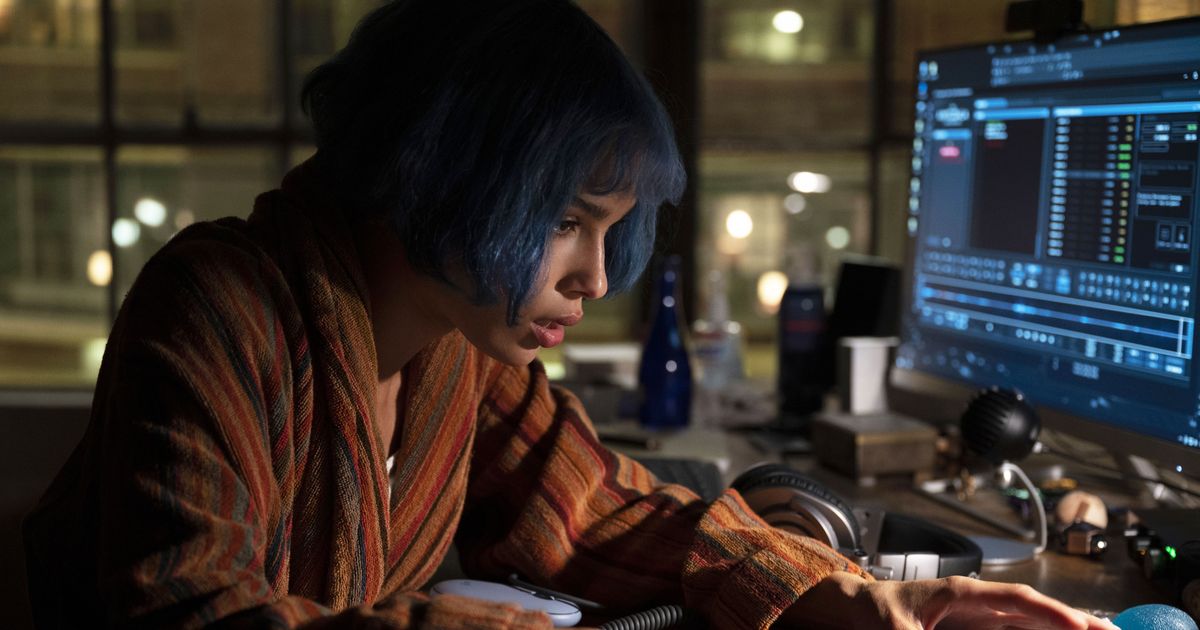Steven Soderbergh is a machine. The man cranks out banger after banger, always delivering a lean and efficient film that grabs the audience by the lapels. He does this on an annual basis, but most only remember him for his award-winning films Erin Brokovich and Traffic alongside his Ocean’s 11 films. 2020 saw renewed attention for his pandemic thriller, Contagion, and in 2016 we were gifted his delightful film Unsane. The man experiments, he stays in his wheelhouse, and is an absolute pillar of the DGA. His latest film, KIMI, directly addresses the anxieties and depression that come from existing in a world that is not only increasingly online but constantly becoming less private.
Zoë Kravitz leads as livewire Angela Childs, an agoraphobic shut-in that holds deep fears of the outside world. Luckily for her, the COVID-19 pandemic hit, giving her an excuse to work from home. Everything she needs is there, and what isn’t can be ordered (like sex with her neighbor across the street, played by an exasperated Byron Bowers). Angela works for Amygdala, a tech giant that has a lot in common with Amazon, and she helps streamline the service of their version of “Alexa,” adorably referred to as “Kimi.” Angela’s job, you see, is to be better than the algorithms of other tech companies by helping to streamline less-focused Kimi requests. When she hears a potential murder on her list she tries to report it, but CEO Bradley Hasling (Derek DelGaudio) and Angela’s boss, Natalie Chowdhury (Rita Wilson), make her the target instead.

Soderbergh’s camera does a lot of the heavy lifting here, helped by the very specific performance of Zoë Kravitz. She ticks like a clock, walking with the awkward gait of someone that has forgotten what social interaction looks like. Sometimes anxiety is easily managed, as Angela does throughout her day, but when the right trigger comes along it gets set off and draws you into the light again. The camera, directed by Soderbergh’s ruthless efficiency, swings from stationary staple to jaunting panic attack as-needed. None of it feels magical, but it doesn’t need to because the point is to remove the barrier between the anxieties onscreen and the ones we hold inside. We live in a world where we know someone is listening or recording at all times (the Instagram ads I get for scarves know exactly how to draw me in), so how do we talk about that? Locking it down due to the pandemic seems to work, a trick I thought would frustrate me (I want nothing to do with COVID movies for at least ten years) and that paid off in spades.
And that’s the main challenge the film presents. How do we really exist in a world that is openly feeling societal anxiety and there is less privacy every day? There’s not really an answer for that, though the attempt is made. It’s a fun conclusion, one that fulfills a satisfying character arc for Angela Childs and that won’t really inspire much in anyone of the viewers. This isn’t the first time that Soderbergh has dipped a toe into the ocean of female anxiety, stories about assault survivors, and lockup (see my beloved Unsane for more of that), but he also feels like one of few filmmakers trying to really grapple with it. This time it was a slightly clumsy effort, but it was a good one nonetheless.

Cliff Martinez has stepped up to score the film, each track sounding like a fluttery panic attack that takes an approach not unlike that of Reznor and Ross. He’s a frequent collaborator with the director (if it ain’t broke don’t fix it), but here he’s gone for something a bit more unique amongst his previous albums. The Red Hot Chili Peppers alum has gone equal parts The Neon Demon and Contagion, meshing two of his previous styles together for something frantic and calming to match the film’s energy. The only thing I could compare it to is experiencing a large amount of anxiety in a spa, the calming music blending with the stress thundering in your ears to creep out into the open.
KIMI isn’t Soderbergh’s best film, but it’s a solid little pandemic thriller that ticks every box it set out to. It’s a lean 85 minutes long and uses every second of that runtime exactly as it needs to. I had barely any notice this was even coming out (that’s also very “Soderbergh”), so my early morning watch was a pleasant surprise in the dreary landscape on increasingly online film culture.
KIMI is currently streaming on HBO Max.

